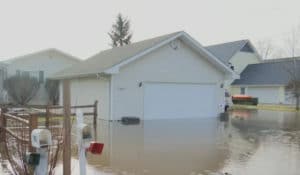As April showers sweep the Midwest, this month’s News to Us includes articles discussing how local and state governments manage water resources with increasingly frequent and severe rainfall events. Click below for articles on how rivers, wetlands, and urban green stormwater infrastructure aid in mitigating flood risk. Also featured—local governments in the Huron River watershed implement pathways to improved management and understanding of resiliency and sustainability.
Wetlands can help prevent property damage and save lives during floods

Due to climate change, the Great Lakes region is seeing more frequent and extreme rainfall events. As a result, flooding may be more prevalent in areas previously considered low risk. Experts argue flood risk can be reduced through wetland preservation and restoration. Natural resource managers across Michigan, including at the Shiawassee National Wildlife Refuge near Saginaw, are identifying potential areas for managed wetland restoration.
In fight for statewide septic code, Michigan property rights a big barrier
With COVID-19, the advancement of statewide septic code legislation has stalled. Nonetheless, state legislators and stakeholder groups are continuing to assess the feasibility of statewide septic code reform. Previous attempts to advance legislation have failed due to concern that code modifications undermine private property ownership. This piece from Bridge Michigan assesses the development of and various stakeholder perspectives on the Michigan septic code issue.
Oakland County Commission approves environmental sustainability projects
In late March, the Oakland County Board of Commissioners took major steps to advance countywide sustainability. First, it approved funding for the Campus Sustainability Planning Project that enables the county to develop plans towards achieving a net zero campus and more sustainable operations of county facilities. The Board also created an environmental sustainability officer position to implement the developed strategy and initiatives.
Flood study sought for Hamburg Township
To assess the frequent flooding along the Huron River and Ore Lake in Hamburg Township, the Board of Trustees in the township authorized a letter of support for an Army Corps of Engineers study. The study will help the township to better understand upstream flow dynamics and watershed inputs contributing to flooding in Ore Lake. Study results will help in future township decision-making and planning to mitigate flood risk.
Opinion: Rivers can be climate change solutions, too
Current funding, policies, and actions to support climate adaptation overlook the power of rivers. The natural features of rivers and their floodplains have immense potential to “act as shock absorbers” to climate change, providing a buffer for swelling rivers. Through the advancement of nature-based solutions, such as flood plain and coastal wetland restoration, rivers can provide solutions to climate adaptation.
New Great Lakes climate change report suggests green infrastructure could help address equity issues
A new report by the Resilient Infrastructure Sustainable Communities coalition finds that large urban centers across the Great Lakes region stand to benefit from green stormwater infrastructure investments. The report, which assessed over 650 counties in the eight Great Lakes states, concluded that green stormwater infrastructure could advance a suite of societal goals, including building resilience, training new workforces, reducing climate risk, and generating economic growth, particularly in communities with histories of disinvestment.



